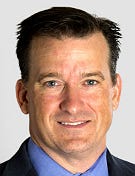At Connect IT Global, Fred Voccola says partners will be busy for quite some time to come.

KASEYA CONNECT — Kaseya CEO Fred Voccola says anyone predicting the demise of tech providers who cater to SMB customers simply aren’t seeing the data that he is.
Speaking at the Connect IT Global 2019 event underway this week in Las Vegas, Voccola told the roughly 1,500 partners and customers in attendance that they should expect to be busy for quite some time to come. The reason is the massive jump in ICT infrastructure spending on behalf of small businesses, the overwhelming majority of whom turn to third-party ICT consultants for support.
Given that small businesses the world over account a greater percent of business activity with each passing year, catering to their ICT needs is not a bad place to be at all, Voccola says.

Kaseya’s Fred Voccola
“Technology will be the key factor that allows SMBs to continue their dominance of the total economic output,” he says.
Anyone who doesn’t believe that this will translate into billions upon billions of dollars in new economic opportunity for channel companies is overly pessimistic, Voccola adds.
The remarks, of course, stand in stark contrast to those who fear for the future of the traditional ICT channel. Take Forrester Research analyst Jay McBain, who spoke recently at the Channel Partners Conference & Expo in April and more recently at ImpartnerCon 19 in May. At both venues, McBain said that as many as 70% of channel partners are looking to exit the business. Why? Several reasons, he explains. For starters, customers are procuring their technology from new sources. In addition, margins have dropped to as low as 17% on certain services. Then there’s an aging channel population. As many as 40% of channel workers are expected to retire in the next four years.
But the data miss the point, Voccola says in an interview with Channel Futures. The existing channel will be in trouble if it doesn’t leverage new tools to operate more efficiently, embrace democratized innovations that are moving down-market from the enterprise to SMB, or replace its aging workforce. None of these existential threats will occur if the channel gets moving, says Voccola.
Here at Connect IT Global, there are plenty of indications that this is already happening.

Datto’s Rob Rae
“I’ve heard the dire predictions and seen the data and admit that it’s all interesting,” says Rob Rae, vice president of business development at Datto. “But it doesn’t reflect what I am seeing in the field. Take the idea that young people are not coming into the business. I talk all the time with owners who are bringing in their children or selling their businesses to new and younger owners. You may not seem them at national events, but come to one of our road shows and you will meet many.”
What’s more, Rae adds, younger workers are demonstrating that they are more open to change than the older generation who ran channel companies for the last 20 or more years. This bodes well for adaptability, he adds.
Charles Tomeo, vice president of worldwide business sales at Webroot, similarly sees new business activity in the channel. In a conversation with Channel Futures this week, Tomeo noted that one of the members of his advisory committee has developed a robust MSP business catering to individual consumers.

Webroot’s Charles Tomeo
“I’m seeing partners create very new and clever routes to market all the time,” Tomeo says. Not all will work, he adds. But many have hope.
Partners, too, see significant growth in channel activity, especially when it comes to managed services. Take Paxis Technologies, a thriving MSP based in Nashville, Tennessee. Paxis started life in the office-equipment and photocopier market before buying an MSP business to supplement its growth. Founder and President Dale Hale says the growth in managed services …
… simply overtook the growth of office-equipment sales, so Paxis shifted its focus.
These observations aside, McBain and others continue to raise legitimate concerns, especially when it comes to new business startups and margin erosion.
Kaseya’s Voccola believes the latter can be reversed with greater automation and efficiencies of scale. At Connect IT Global, he went to great length to show his audience that simple integrations of best-of-breed products rarely deliver on the promise of interoperability, ease-of-use and more. That’s because vendors slip up when it comes to release synchronization, backward compatibility, security verification, UI elegance, workflow triggers and long-term commitments.
A better way? You guessed it: Go all in with Kaseya IT Complete, which will, over time, provide all of the above, Voccola says. Today, fewer that 5% of Kaseya customers use every product in the IT Complete platform. But Voccola expects that to change. In a mere few years, for example, he says that as many as a quarter of existing Kaseya customers will use technology from ID Agent, Kaseya’s latest acquisition.
The emphasis on its own platform doesn’t mean Kaseya won’t support other vendor’s products going forward. But don’t expect the moon when it comes to integration quality, Voccola says.
“Kaseya prioritizes workflow integrations. But most in the industry are cosmetic,” he says.
Read more about:
MSPsAbout the Author(s)
You May Also Like


